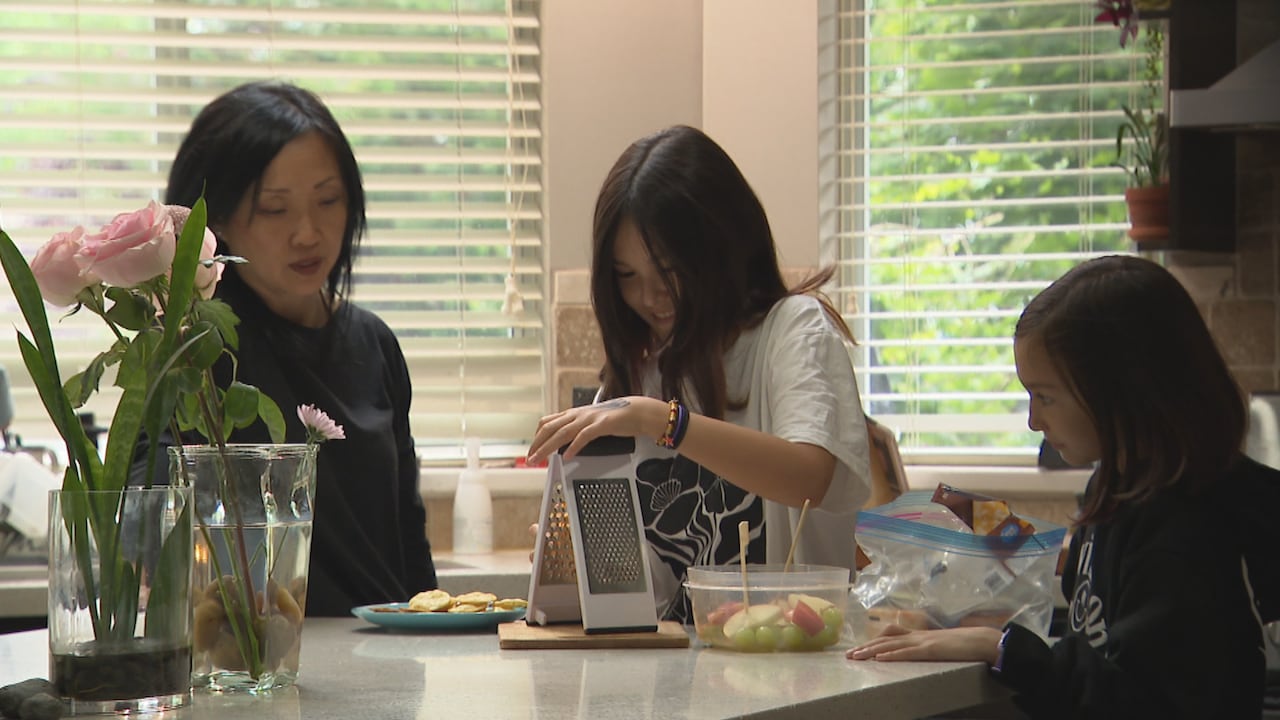More screen time linked to lower test scores for elementary students, study finds

As a working mom of four, Anne Whitmore knows the draw of an iPad screen all too well — that's why she and her husband have some hard limits in place, allowing their kids just an hour a day on their devices after school.
After dinner, the tablets and phones go away, and there are no screens except for a bit of TV watching. Despite their rules, Whitmore says it's not always easy to avoid screens, or know how to manage them — especially when she’s working from their Surrey, B.C., home and tending to her kids’ demands for entertainment.
“As a parent, we're constantly struggling with how do we prepare our kids for the future? How do we get them ready for a digital world, but also balance the need for, you know, having a broader perspective and having … other skills of critical thinking and social-emotional intelligence?” Whitmore told CBC News.
There are lots of reasons to be concerned — screen use has been linked to poor mental health, sub-par sleep and not enough physical activity. And according to a new Canadian study out Friday, all that screen time can also have an impact on school performance.
The study by a team from Toronto's Hospital for Sick Children (also known as Sick Kids) and St. Michael’s Hospital was published in the Journal of the American Medical Association. It found that children who spent more time on screens before age eight scored lower on standardized tests.

The study followed more than 3,000 kids in Ontario over a 15 year span from 2008 to 2023, tracking how much time they spent watching TV or DVDs, playing video games, using the computer or playing on handheld devices like iPads, as reported by their parents. That data was compared to their EQAO standardized test scores, which are used to assess the reading and math skills of kids across Ontario in grades 3 and 6.
The findings point to a “significant association,” between screen use and lower test scores, according to Dr. Catherine Birken, a pediatrician and senior scientist at Sick Kids and lead author of the study.
“For each additional hour of screen use, there was approximately a 10 per cent lower odds of meeting standards in both reading and mathematics … in Grade 3 and mathematics in Grade 6,” said Dr. Catherine Birken, a pediatrician and senior scientist at Sick Kids and lead author of the study, in an interview with CBC News.

The study didn’t differentiate between different types of screen time — for example, whether a child was playing a game on their iPad versus FaceTiming a relative in another city, or watching an educational video.
It was also an observational study that relied on parents answering questionnaires about how much time their kids spent in front of screens. The study authors note that this means the research can’t be taken as definitive proof that screen time causes lower grades, just that the two things tend to go hand in hand.
But Dr. Sachin Maharaj, an assistant professor of educational leadership, policy and program evaluation at the University of Ottawa, who was not involved in the study, says the findings are consistent with the wider body of research that’s shown the more time kids spend in front of screens, the worse they perform academically.
“All of this [screen time] trains our attention in particular ways that may make it harder to focus for long periods of time. And that translates into learning, where if you can't focus, it's just harder to learn and think deeply,” Maharaj told CBC News.
Maharaj expects spending more time on electronic devices would also mean less time spent on other activities that might be more beneficial to children’s development — things like interacting with people face-to-face, or being physically active outdoors, which is proven to be linked to better academic performance.

The findings aren’t a surprise to Whitmore. She’s also the president of the Surrey District Parent Advisory Council and has repeatedly heard from classroom leaders that kids are struggling because of their screen use.
She says one principal recently shared an anecdote about a student who was falling asleep in class because they had been awake all night playing video games. And parents also tell Whitmore how much of a struggle it is to get their kids to put away their tech.
“It's such a fight, you know, and kids can be relentless,” Whitmore said. “So it's very draining to hold a boundary. And I think sometimes with parents, it's just easier to give in.”
A number of Ontario schools and school boards have also sued big tech companies behind some of the apps that kids are drawn to, like Snapchat, Instagram and TikTok, saying apps and sites from those companies have rewired the way kids think and made it harder for them to learn.

But Birken notes that the study isn't meant to make parents feel bad for giving their kids screens.
“This is not a shaming and blaming opportunity,” she said, noting that finding ways to steer kids toward a healthy amount of screen use should be a team effort between parents, teachers, doctors and policymakers.
According to Birken, while further study is needed to better understand the impacts of how different types of content impact kids' learning, she says there are steps parents can take in the meantime.
She point out that the Canadian Paediatric Society recommends steps like prioritizing educational content and having parents and kids use screens together in order to foster healthier media consumption.
Whitmore says that while her family's one hour rule isn’t perfect, it has worked well for them. She says providing her kids with guidelines helps set them up for success and reduces arguments.
“It really does help some of that back and forth," she said. "In our view, it's non-negotiable.”
cbc.ca





